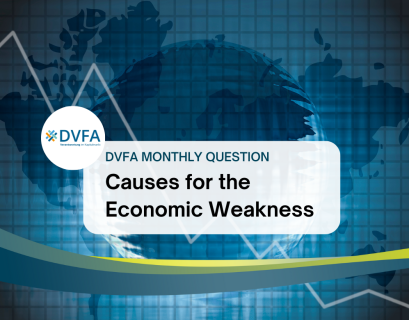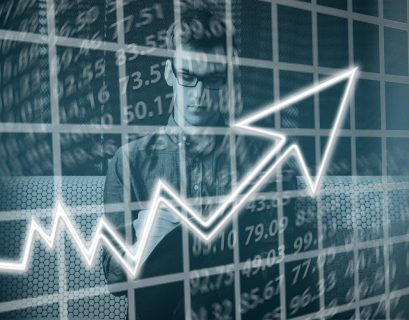- Inflation has passed its peak, but remains too high.
- Global economy growing again, but flatter.
- Germany: recession is overcome, long-term problems remain.
- Bonds are back: competition between dividends and interest rates is open.
DekaBank’s economists are cautiously optimistic about the new year. For 2023, they expect global economic growth of 1.8%. “Although global growth will be lower in the coming years than we have been accustomed to over the past three decades, we will remain on the growth path,” says Dr Ulrich Kater, Chief Economist at DekaBank. For Germany, he expects a decline in gross domestic product (GDP) of -0.7 per cent. However, the economy should pick up speed as early as the middle of the year, so that the economy as a whole turns positive again in 2024. “The recession will not be as pronounced as many still feared in the autumn,” says Kater. The German economy is very adaptable. It has already proven this during the Corona years 2020 and 2021. Even if the coming winter is mild, however, the problems will not disappear: “In order to manage without Russian supplies, gas will have to be saved over the entire year 2023 in the way it is being saved this winter,” the chief economist points out. Energy prices in Germany will remain higher in the medium term than they were before the war in Ukraine.
Although Kater does not see a widespread de-industrialisation in Germany, he does see growth slowing down if the locational conditions are not actively improved. “Germany and Europe in general must be careful not to be left behind by the global growth train,” the Deka economists assess. The income reductions directly associated with past inflation could be made up by 2026.
Peak of inflation overcome
On the central bank side, both the US and European central banks have regained credibility on the capital markets after their initial hesitation in fighting inflation, not least through “jumbo interest rate steps”. In addition, the US Fed has already actively initiated bond sales worth around 300 billion US dollars. “In the US we have passed the peak of inflation, in Europe it is imminent. Inflation will fall significantly, but will remain above the central banks’ two per cent targets,” Kater predicts. He sees the causes for the high inflation on the one hand in an over-stimulation of global demand for goods that began as early as 2021 and through oversized fiscal programmes during the Corona pandemic, and on the other hand in Russia’s war of aggression on Ukraine, which alone is responsible for about half of the current extremely high inflation rates.
DekaBank economists expect a money market rate of 2.75 per cent in the eurozone and 4.75 to 5.00 per cent in the USA by mid-2023. The key question now is whether the measures indicated by the central banks will be enough to keep inflation under control or whether they will have to step up their game: “There are good arguments that the expected tightening of monetary policy is sufficient to keep inflation in check,” says Kater. There is no single measure of when it is good, he said, because that will be measured by a broad-based assessment of the inflation picture in the coming year. However, Kater does not see a return to a zero or even negative interest rate phase in the longer term: “Interest rates have come back to stay.”
This also has an impact on the savings activity of private households, which on the whole is not that bad. It is true that lower-income households are having problems making ends meet and that the savings performance of wealthier households is also declining in many cases. This is reflected in an overall decline in the savings rate from the long-term average of 10.2 to 9.4 per cent. However: “This means that financial assets amounting to about 70 billion euros are still being newly created in Germany every quarter.”
Bond markets look back on historic crash
“The capital markets are in the stranglehold of the central banks,” says Joachim Schallmayer, Head of Capital Markets and Strategy at DekaBank, commenting on the situation in the capital markets. In his opinion, this will not change in the near future. “The central banks have made a policy change across the board that will last well beyond 2023,” Schallmayer emphasises. However, he says, the interest rate peak in the euro area is “within reach”, while it has already been exceeded in the US. “The new environment was priced into the capital markets at record speed and the experiment of negative interest rates is now finally a thing of the past,” Schallmayer says. Looking back, he notes, “There was no way to escape the changed interest rate environment in 2022.” Thus, even short-dated government bonds recorded losses. From today’s perspective, however, the earnings prospects for the coming years would have improved significantly. Permanently higher interest rates are to be expected. “The big level adjustment is behind us and the higher interest coupons reduce fluctuations. This improves the earnings outlook for this asset class,” says Schallmayer.
For the valuation of corporate bonds, it depends not only on the assessment of the general interest rate development but also on the assessment of the spread levels. “We expect a mild economic downturn,” says Schallmayer and argues that from a fundamental point of view, a very good risk-return ratio has now been achieved for corporate bonds, especially in the high-yield segment. However, active stock selection and broad diversification are particularly important in this segment.
DekaBank believes that 2022 will certainly not be remembered as a good year for the equity market, but also not as a seriously bad one. The Russian war of aggression in Ukraine contributed to a great deal of uncertainty, and for the capital markets the interest rate turnaround was the overriding influencing factor. “The dominance of interest rate movements on the stock market can be read very well in individual stock segments,” Schallmayer points out. For example, the outperformance of growth stocks over substance stocks, which has been observed for years, has reversed. “With the abrupt rise in interest rates, not only the growth outlook of growth stocks but also their high valuation was called into question,” he says, explaining the price losses of tech stocks from the USA in particular.
Low equity valuation is the trump card
In Germany, Europe and the emerging markets, equities – measured by their expected price-earnings ratios (P/E ratios) – were trading above their historical averages at the beginning of 2022. The price declines in the course of the year with overall stable to slightly higher corporate earnings have caused valuations to fall noticeably in the meantime. With the exception of the USA, where valuations in the technology sector in particular still need to be adjusted downwards, the equity markets are currently moderately to favourably valued. “A low valuation lays the foundation for long-term investment success,” says Schallmayer. What is important now is that corporate earnings are not too heavily burdened. So far, he says, companies have withstood the difficult economic environment well. This is thanks to stable demand – with limited supply in some places – and the rise in inflation, which has caused the sales of many companies to increase significantly. However, Schallmayer assumes that the difficult real economic environment will increasingly leave its mark on companies’ earnings figures.
The analysts’ consensus expects overly optimistic profit increases. Schallmayer expects profits in 2023 to stagnate at most at this year’s level. More likely, however, is a decline in profits in the low to high single-digit percentage range, he said. “In addition to weakening demand, price increases are now hitting companies and no longer only affect raw materials, but increasingly also labour costs,” Schallmayer says. At the index level, it is primarily the IT companies, which are heavily weighted in the USA, that are weighing on profit dynamics. However, this is more than compensated for by the special economic situation in energy stocks, which are also heavily weighted. All in all, Schallmayer believes that concerns about a massive slump in profits are exaggerated; companies are going through a phase of weakness, but not a global recession.
Shares remain attractive not least because of dividends
A slight dip in profits does not jeopardise the ability to pay dividends. “We expect stable dividends from DAX companies,” says capital market expert Schallmayer. However, with the rise in yields, especially in the high-yield bond segment, dividends are facing serious competition. “Over the next ten years, we even expect total returns from the high-yield segment to be somewhat higher than those of equities. However, you continue to be noticeably lower with top quality corporate bonds.”
“For investors, the investment universe is widening significantly again,” says Schallmayer. In addition to shares, bonds have become much more attractive again and so the competition between dividends and interest rates has reignited. The capital market expert sees the DAX at 14,000 points at the end of 2023, roughly at the current level.
Source: DekaBank Press Release from 30 November 2022
Image: Matt Duncan via Unsplash
This is an automated translation of the German press release.





